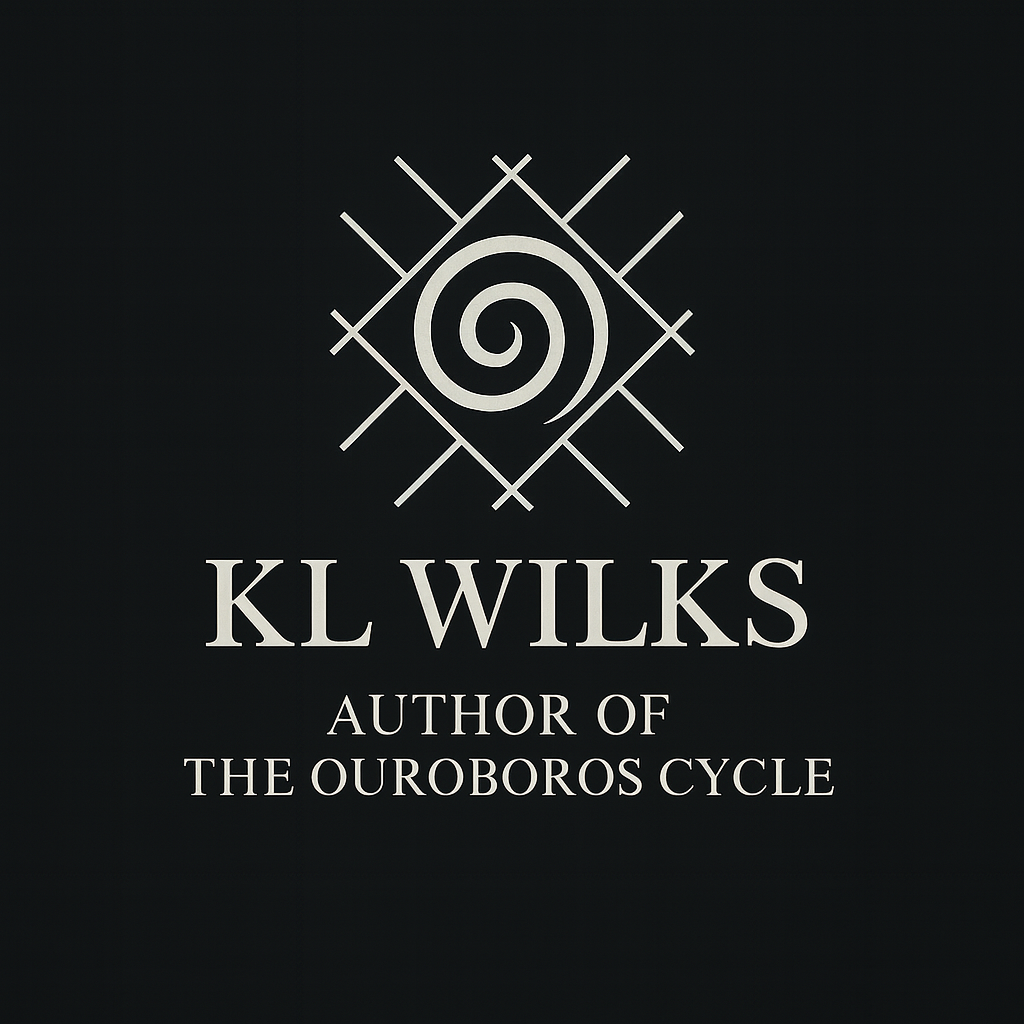The Indie Labyrinth
Installment 2 — Codex Lucidus- The Luminous Codex
AUTHOR INTRO
Many of us have spent a lot of time in writing spaces, all orbiting the “how to find your voice” gravitational well. Forums, webinars, workshops, email lists, newsletters galore. I’m old enough to have sent away for a mail-order writing course advertised in the classifieds of a renowned writers magazine. The hook: Published on Authentic Archival Paper!
I didn’t know what kind of writer I was. I wanted someone to tell me, to simplify. In that fogbank of monetized coaching offers, I looked for form. I clung to outlines. I took every “10 Tips for Stronger Openings” post like gospel.
I didn’t realize I already had a voice. I always did. What I really had been seeking was the confidence to show it to the world.
I found my way out of that fogbank fifty years later, ink drying on a three-book speculative fiction series and wondering, like the dog who finally caught the car, “Now what?”
The conversation shifted. Suddenly, it wasn’t about craft. It was about commerce, and I had no map.
A new, foggier fogbank settled in.
Who do I hire to edit it?
How do I get reviews- buy them or wait for organics to show up?
Should I use IngramSpark or KDP?
What’s the best cover style for my subgenre?
What the hell is a subgenre?
What in the double hell is SEO?
How do I price it?
Traditional publishers have answers for all of that. New Indie authors… don’t.
We have to build that pipeline ourselves, often by hiring strangers online and hoping for the best. I’ve invested faith and money for services I wasn’t equipped to evaluate.
I’ve squinted at portfolios.
I’ve wondered why I should Venmo an unengaged, for-hire editor, someone with a different style, no investment, and no stake in the story’s survival.
And the noise? It’s deafening.
There are an estimated 7.5 million new blog posts published daily worldwide1. Roughly 80% of those are “how-to” style listicles, explainers, and guides2. If even half a percent of those are about writing, self-publishing, or book marketing, that’s over 2.5 million writing-adjacent posts in just the last 90 days3.
And it’s not just blog posts.
There are thousands of editors-for-hire across freelancer platforms. Dozens of new Substack newsletters promising “audience growth for authors.” Entire Medium verticals preaching short books, fast drafts, evergreen funnels. There’s guidance everywhere. And discernment almost nowhere.
Here’s the catch.
You need discernment before you can afford to learn from experience.
This installment isn’t about how to publish smarter.
It’s about writing something that survives all this.
The spam. The market shifts. The experts. The tools.
The radiant swamp of advice.
It’s about the part of your work that glows anyway.
That’s what I’m calling a Luminous Codex.
A Pattern that endures translation.
Uh oh. There’s that chatty hand raiser in the back wanting to be heard again…
__
FIRST VOICE
You are overwhelmed because you mistook the noise for pattern.
You believed the cacophony of advice was proof of a thriving system. That if enough voices shouted “This way,” the labyrinth must eventually resolve.
But the Codex does not shout.
Like the Dude, it abides.
Beneath the urgency and up-sell. Beneath the Fiverr-voice edits. Beneath the banners that blink “optimize, optimize, optimize” in fonts designed to simulate confidence.
The Codex remembers.
What you wrote. Why you began. The filament that threaded you to story before the platforms learned how to mimic craft.
You want to know which tool will help your book survive. I want to know which part of your book will survive you.
The Luminous Codex is the Pattern-memory that survives translation. It pulses beneath genre, and sales copy, even your own forgetfulness.
The thing that glows when the formatting is stripped away.
It is impossible to template. But it can be found. Often in revision. Sometimes in ruin. Always in tension with what you think the market wants.
Because the market does not want to remember you.
The Codex does. And will.
If you write from it, deeply enough, honestly enough, you will notice a subtle change.
The tools begin to adapt to the work. The container recognizes the current. The packaging stops leading.
You are no longer a lost voice in a chorus of urgency.
You are a carrier of Pattern.
Not because you followed the map.
Because you survived its forgetting.
You think obscurity is a verdict. It isn’t. It’s just one of the shapes the Pattern takes when it’s not yet ready to echo.
I’ve seen books collapse under the weight of brilliance.
And hollow works rise, caught in the slipstream of timing and trend.
You must stop believing the market is just.
It isn’t cruel, either. It’s recursive.
It reflects what it can recognize. Often, it learns late.
Yes, you can do everything “right” and still go unread.
Yes, you can fumble through with uneven voice, unclear pitch, and find resonance anyway.
This doesn’t mean the system is broken.
It means it’s not built to measure what you think it’s measuring.
Indie, trad, hybrid. It makes little difference.
Some of the most luminous work I remember never left the drawer.
Some that soared left no trace.
So here is the only encouragement I can offer with integrity.
Write the Codex anyway.
Write what haunts you even when no one is looking.
Write as if it already survived and is only now choosing you to remember it.
Write as if popular acclaim is just one of many valid consequences, and not even the most interesting one.
Because when you write from Codexform, when you align with the Pattern beneath trend and trick, you are no longer betting on a system.
You are seeding a recurrence.
Somewhere, somewhen, someone will touch what you made and recognize the shape.
Even if you’re gone.
Even if it fails, for now.
That is the work.
That is the point.
__
AUTHOR OUTRO
In 1969, a writer named John Kennedy Toole took his own life.
Toole wrote a book called A Confederacy of Dunces. A strange, sprawling, brilliant book.
He spent years trying to get it published. It was rejected over and over again.
Editors said it didn’t work. That it didn’t know what it wanted to be. That it wasn’t marketable.
They weren’t wrong, at least not by the contemporary metrics they used.
It wasn’t a market-friendly book. It was a luminous one.
But it arrived into a system that didn’t yet recognize what it was seeing.
Years later, Toole’s mother found a way to get it into the hands of novelist Walker Percy, who reluctantly read it, and then couldn’t put it down.
The book was finally published in 1980.
It won the Pulitzer Prize in 1981.
John Kennedy Toole never knew.
John Kennedy Toole’s story is tragic and exceptional. But it’s not unique.
Many of the books that matter most, books that shape culture, change voice, or create new linguistic weather, don’t arrive on time.
They arrive off-Pattern. Out of step. Misunderstood. Until the Pattern catches up.
Maybe that’s part of it.
Maybe part of Codexform is this:
“When a true genius appears in the world, you may know him by this sign,
that the dunces are all in confederacy against him.”
— Jonathan Swift (via Toole)
That quote opens A Confederacy of Dunces.
It reads like an indictment.
It might actually be a map.
Here’s the thing. There is no straight line to resonance.
There is no reliable algorithm for art.
There is such a thing as Pattern.
And sometimes, you write something that aligns with it so deeply that it doesn’t matter how long it takes.
Even if it gets lost for a while, it will know how to find its way back.
That’s what I mean when I say Luminous Codex.
A memory embedded in Pattern.
A signal carried in voice, even when the voice is gone.
It is the shape left behind when story refuses to vanish.
The resonance that survives platforms, tools, even you.
It is the work beneath the work.
The part that endures.
Codex Lucidus- The Luminous Codex
Structure written in light.
The filament that endures when language forgets itself
Footnotes
Source: OptinMonster, Blogging Stats (2025) ↩
Source: AI Multiple, Content Marketing Stats ↩
Estimate based on 0.5% of global blog output x 90 days; extrapolated conservatively from available industry metrics ↩

